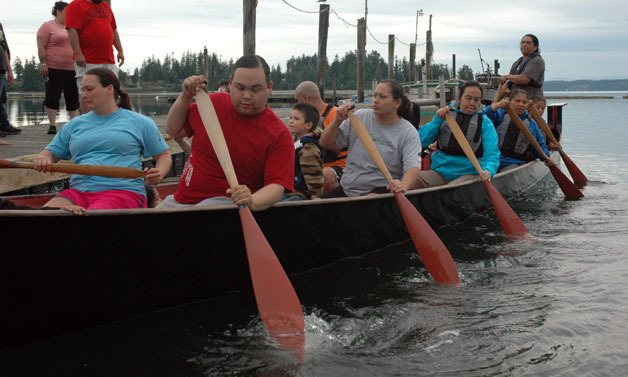TULALIP — Since the middle of April, close to 30 rowers have been preparing for this summer’s tribal canoe journey, and Tulalip Tribal member Jason Gobin wants to make sure they meet the water ready for the challenges with which it will present them.
“The biggest thing is to make sure everyone respects the water,” Gobin said at the Tulalip Marina on Wednesday, May 30, before tribal members put their “big brother” canoe into the water. “It can look calm, but that’s deceiving. It’s the most powerful thing out there.”
The Tulalip Tribes’ regularly scheduled canoe practices are exercises in hands-on learning, by taking groups of as many as a dozen at a time out on the water to row as far as a few miles offshore in Tulalip Bay. Gobin acknowledged that much of the canoe practice relies on simply doing, and in the process both building up one’s endurance and developing a rhythm with one’s fellow rowers.
“It’s hard to keep good time if one person is out of balance,” Gobin said. “You’ve got to work together to get a good momentum going. Fitness is also important — running and cardio are good for getting in shape — but mental toughness is just as important. You can be in the best shape of your life, but when you pull eight or 10 hours, it makes for a long, draining day, especially if the wind and the waves are against you.”
The average tribal canoe journey can take between 17 to 20 days, with a week-long celebration at the end destination, which will be Squaxin Island this year. As exhausting as the trek can be, Gobin appreciates the relative tranquility of the environment, which connects him more closely to the lives of his ancestors.
“We’re traveling on what were their highways,” Gobin said. “Before we had roads, this was all forest, so all they had was the water.”
“When you look at the landing sites for the journey from land, you wonder why some of them were chosen, but when you see them from the water, it makes sense,” said Theresa Gobin, one of the four “Canoe Sisters” in her family “since I was young and skinny,” who expressed pride in her mother being the only woman rower for Tulalip in 1989. “It gives you a whole different way of looking at life.”
Sheldon echoed Gobin’s assertions of the equal importance of physical fitness and a positive attitude to completing a tribal canoe journey.
“You’ve got to trust your skipper at all times, because he’s the boss on the water,” Sheldon said. “It can be hard to be a team when everyone is dealing with their own strengths, but you have to try not to be tired or cranky, to stick it out and keep going.”
Sheldon laughed as she listed rough waters and “ferry-chasing” among her favorite aspects of tribal canoe journeys, but turned serious as she recalled how those journeys have brought her and her family closer together.
“It’s a way for us to live out our culture,” Sheldon said. “It’s not gone away. It’s current and ongoing, every time we practice appropriate protocol like the commands of the canoe and how to conduct ourselves when we come into shore.”
At the age of 13, Kiana Hernandez is not nearly as experienced at tribal canoe journeys as Sheldon, but having gone on close to half a dozen of them, she’s an old hand in her own right.
“You have to get up early in the morning to get your pancakes down and pack up to leave in time to arrive at your destination by a certain time at the end of the day,” Hernandez said. “I like it because I get to see my friends and sing with them as we pull together in the canoe.”
Hernandez agreed with Sheldon that negativity needs to be kept to a minimum during such shared treks, which she credited with holding potentially negative influences at bay even when she’s on dry land.
“It’s had a big impact on my life,” Hernandez said. “It keeps me away from the bad crowd and from drugs and alcohol. It gives me pride in my culture and something to look forward to during the year.”
July 29 is the official landing date for this year’s tribal canoe journey in Olympia, after which the celebration and potlatch protocol will follow from July 30 through Aug. 5 at Kamilche, Wash.



